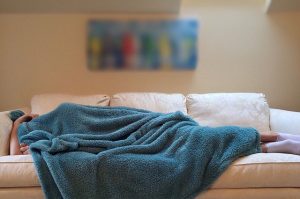During this time of pandemic induced hunkering down, I find myself feeling tired despite having not done much all day. My friends tell me the same thing is happening to them. Like Newton’s law that a body in motion stays in motion, and a body in rest stays at rest, it seems like the less I do, the more I want to take a nap. I realize that this faux fatigue is just the by-product of staying at home, a recent surgery for a broken arm, and getting used to life at a different pace.
Real fatigue however can affect the quality of your life, and may manifest in a number of different ways. Some people are so completely exhausted  that they have difficulty getting through their day. Others manage to get things done, but struggle with motivation—it all just seems so hard. Many people are tired only at certain times—late in the day, after eating, or mid-afternoon.
that they have difficulty getting through their day. Others manage to get things done, but struggle with motivation—it all just seems so hard. Many people are tired only at certain times—late in the day, after eating, or mid-afternoon.
In western medicine, fatigue can be caused by anemia, thyroid issues, blood sugar problems, or the Epstein Barr virus that causes chronic fatigue syndrome. In addition, fatigue can be the side effect of certain medications. However, after those diagnoses have been ruled out, a western doctor may have a hard time getting to the bottom of why you’re so tired.
In Chinese medicine however, there are many patterns that are associated with some element of fatigue, and the nature of your fatigue is often a clue to its source. In general, fatigue is caused by either a depletion of some body substance (Energy, Blood, Yin, or Yang) or there is some kind of blockage or impaired flow.
Here are some common patterns in Chinese medicine that can be a source of fatigue:
Energy (Qi) Depletion. Energy, called Qi, powers your body and comes from the food you eat and the air you breathe. This kind of fatigue can arise if you’re not eating well, have funky digestion, or suffer from lung issues. If your digestion is poor, you may feel tired right after meals, because your body is diverting all your energy into digesting what you’ve eaten. You may also feel exhausted or short of breath after any kind of exertion, but feel better after resting.
Blood Depletion. This pattern is a little like being anemic, and can be brought on by a loss of blood, a chronic illness, or poor diet. It’s a common problem among people who have had surgery recently and new mothers. The fatigue associated with this pattern is also worse with any kind of activity or exertion. Sufferers may appear pale and experience eye problems, dizziness or feeling light-headed, and have dry skin, hair or nails.
Yang Depletion. In your body Yang is a substance that works a little bit like a pilot light, which warms everything up and keeps things moving. People with depleted Yang feel a deep and disabling fatigue; and some can’t even get out of bed. Because their pilot light is low, Yang deficient people also feel cold at their core, especially in the winter, have a hard time warming up, and may retain water. Fatigue associated with this pattern is aggravated by any kind of activity. This is a common pattern for people with hypothyroidism.
Yin Depletion. This is a pattern frequently seen in the clinic, especially among women going through menopause. In contrast to Yang’s pilot light, Yin acts like a nourishing coolant, keeping your body moist and keeping the warmth of Yang in check. Yin depletion is kind of an odd pattern in that sufferers may feel fatigued, yet feel jittery at the same time, and is associated with symptoms such as night sweats, waking or restless sleep, dry skin, and a dry or sore throat on waking. Often symptoms are worse with overwork and stress.
Liver Energy Stagnation. This pattern is considered both a blockage and a depletion. Your Chinese Liver is responsible for the smooth flow of everything in your body. However when there is a blockage of the Liver, your digestion usually is also affected. The result is that your ability to  convert food into energy is hampered. The fatigue you feel with this pattern is intermittent, you may feel tired in the morning, and actually feel a little better with movement or as the day goes on. Symptoms are usually aggravated by stress or emotional upsets, and can cause PMS. Many people with Liver stagnation would describe themselves as irritable or depressed. This pattern is likely on the upswing during the Covid pandemic, as it’s usually a psychological response to things not going well in your job, relationships, finances, or life.
convert food into energy is hampered. The fatigue you feel with this pattern is intermittent, you may feel tired in the morning, and actually feel a little better with movement or as the day goes on. Symptoms are usually aggravated by stress or emotional upsets, and can cause PMS. Many people with Liver stagnation would describe themselves as irritable or depressed. This pattern is likely on the upswing during the Covid pandemic, as it’s usually a psychological response to things not going well in your job, relationships, finances, or life.
Accumulation of Phlegm or Dampness. Okay, this sounds really gross, but it’s a pattern that I have frequently seen in the clinic. Dampness occurs when your body doesn’t metabolize fluids or moisture very well. It’s a little bit like a farmer’s field that doesn’t drain after a heavy rain, where the water sits around and becomes muddy. When dampness sits around for a while in your body, it congeals and becomes phlegm. People who have phlegm and dampness feel heavy or weighed down. The also tend to have poor digestion or are overweight. They may also have visible phlegm, like sinus problems, a chronic cough, or asthma.
Pain. Chronic pain has the ability to really wipe you out. This is also a pattern of both blockage and depletion. Basically, pain acts like a dam in your body, in which the pain is blocking your overall circulation, movement, and the flow of energy. Because your energy is caught up in the stagnation, you feel tired. Also, dealing with the pain psychologically wipes out your energy. Over time, the pain may become secondary to the fatigue it has caused.
While there are a number of underlying causes of fatigue, the good news is that you don’t have to go through life tired. Fatigue associated with any of the patterns above can be treated effectively within the framework of Chinese medicine. A practitioner can create a plan for you based on your specific pattern and needs. Treatments for fatigue may include acupuncture sessions, an herbal formula, food therapy, and other healing methods to help you regain your vitality.



